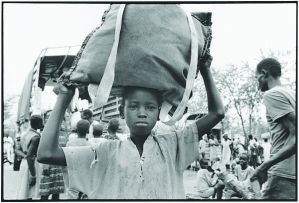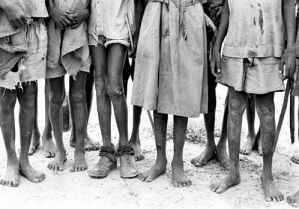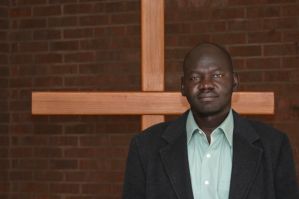Editor’s Note: This story won 2nd place for the Chandler Award for Student Religion Reporter of the Year
by Kelsey Kastrava and Danielle Alio
Remembering life before the war, Malual Deng Duot pauses quietly as he recalls images of life as a happy adolescent living in Southern Sudan.
“Before the war, we were happy and you see mom and dad everyday,” Malual said. “Life was normal. Woke up and go to eat and play with the kids of your age. Come back home. Be happy kids like the rest.”
This ended abruptly after the day Malual heard the gunshots.
“We see military vehicle in the village killing people, crying, noise. And you run from where you were.”
In 1991, at age 9, Malual left his neighborhood, his family, his friends and all of his bare necessities. He described running with only the clothes and shoes he had on. Both the clothes and shoes, however, would fall apart.
“After that day, no relative, no sibling. Just separated.”
As Malual continued running without any stopping, he cautioned himself when coming in contact with other people, not knowing if they were an ally or the enemy.
“When we run, we didn’t go back home because we saw the gun shot from where we came. Everyone was running too and we hoped we would meet parents and families but we didn’t meet them.
There were so many kids gathering and we were told to go to the east direction.”
Malual’s story is shared by over 20,000 other boys his age who were a part of the devastation that Sudan’s civil war brought upon its people from 1983-2005 when the country signed an international cease fire agreement.
Since 1983, Sudan, Africa’s largest country and home to the continent’s longest running civil war, has endured conflict that has claimed almost two million lives and has left millions more displaced. Among those displaced were the “lost boys.”
For the next several months, Malual and the lost boys walked day and night, with no food or water, no guardian, no shelter, no sense of where their destination would be.
Malual and the group of boys were told that Ethiopia was a safe place to go.
“When they realized that there were so many kids without parent, they sent some people like guardians and people who know how to get there [Ethiopia] who went before. They were sent to take these lost kids, wanderers, to take them there to go to school, or maybe to grow up,” Malual said.
According UNICEF.org, those who survived the walk to Ethiopia began to live in relative peace. However, soon after their stay a change of government in Ethiopia caused the lost boys to flee back to their home in Sudan. 
The journey this time endured heavy rains that took the lives of many in swollen rivers.
“I saw some people giving up, but I said no. I would keep going. It’s my heart that keeps me going,” Malual said.
Malual’s bravery was tested many times, as he would witness many of his fellow lost boys give up. He recalls leaving many boys behind who could not take the unbearable conditions any longer and lay down to die. Malual was aware of the wild animals that existed among their walking paths and that many boys were eaten, both those dead as well as those still alive.
“When you pass by, you see some piece of body. If somebody slept there overnight, hyenas, lions eat them. You see some bodies and bone left over. People were scared. You think, maybe that could be me,” Malual said. Malual recognizes the odds he was against at making it both to Ethiopia and then back to Sudan.
The International Committee of the Red Cross saved those who survived the trek back home to Sudan. Unfortunately, this security became temporary as war broke out around them and the lost boys along with all other refugees were forced to migrate again, this time to Kenya.
Malual was in his third and final journey in the torturous conditions. He says his saving grace was a clear mind.
“Some people give up because we don’t even know where to go. People were homesick. Mom and dad were not there. There was no food. People were recalling everything they had at home. ‘At this time I used to eat this,’ but people like me and the rest [who survived] would just ignore those. People would keep thinking and they didn’t make it.”
Malual stayed in a Kenyan refugee camp for several years, where he worked hard to learn and study despite humble conditions. After passing eighth grade in the camp, Malual was awarded a scholarship to further his education in high school.
 It was during high school that Malual learned he had a chance to come to the United States.
It was during high school that Malual learned he had a chance to come to the United States.
He underwent a long application process in which he had to pass several tests, both academically and medically. He finally received confirmation that he would be migrating to another country, this time, not by foot.
In 2001, nearly a decade after the lost boys set foot on their journey, the U.S. welcomed 3800 Sudanese refugees who were sent to about 38 cities. Since then, almost 7000 lost boys have been brought here to have a better life.Malual has a bachelor’s degree in international affairs from Wagner College in New York and is completing a master’s degree in political science at Villanova University. He is married to a Sudanese woman and has two daughters, an 8 month old and a 3 year old.
Since Malual has left his home country, Sudan’s people voted for south Sudan to secede from the north and form a separate country, a decision that everyone hopes will end the conflicts.Malual spoke recently to an online audience as part of Catholic Relief Service’s efforts to educate Americans about Sudan.
This past January, Malual was able to cast a vote at an international polling location in Alexandria, Va. His vote counted to secede from the north, with intent of building a Sudan without any lost boys.
“We hope for Southern Sudan to be a democratic country. We are hoping for a peaceful transition from being a fighting party to become a political party whereby you can provide services to people. Roads and schools, hospitals, things like that and I hope there should be no more war within Southern Sudan,” Malual said.
Malual Deng Duot is a Lost Boy of Sudan who was forced to leave his home country in 1991 at the age of 9 because of a civil war that tore Sudan apart. This is an interview with Malual and a woman named Barbara Di Lucia who took in two Lost Boys and raised them as her own. This video was produced and edited by Danielle Alio



